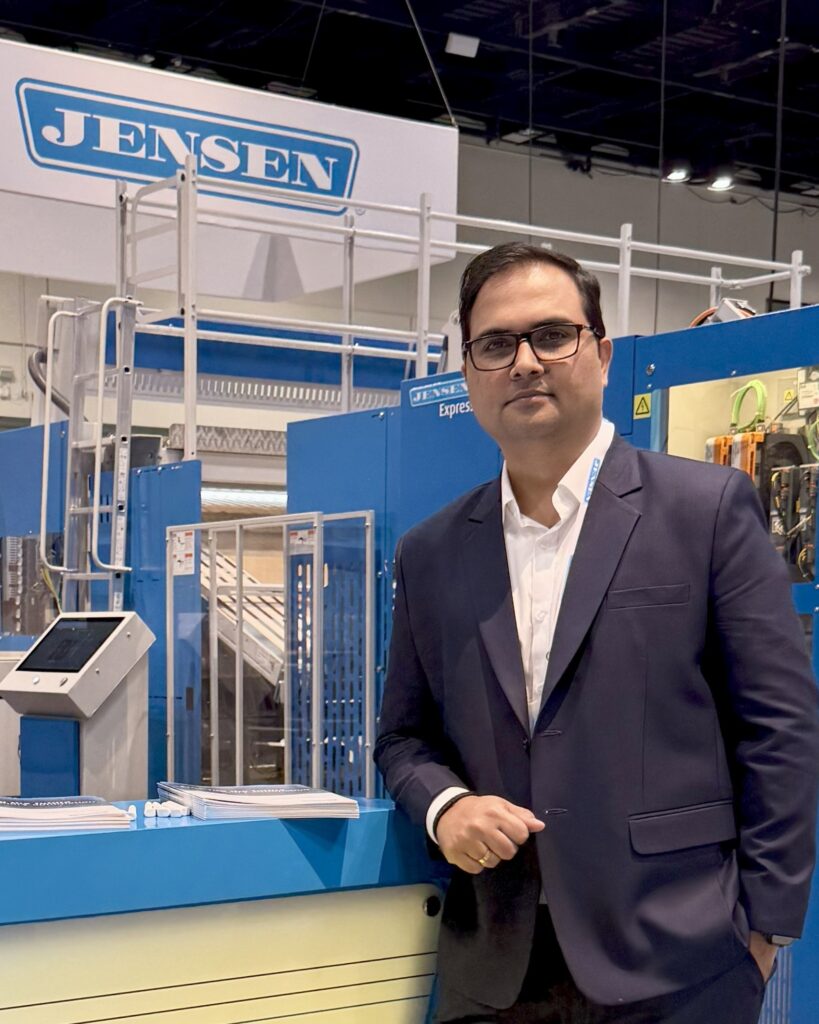It is time to redefine the future of the commercial laundry industry’s focus on sustainability, automation and energy efficiency. In an exclusive conversation, Anand Dubey, Country Head, JENSEN India, who recently took charge, shares his vision for advancing smart, green, and high-performance laundry operations across the nation. JENSEN is leading India’s transition towards more efficient and environmentally responsible laundry systems.

Q. What would be your joining statement to the industry stakeholders, laundry operators, investors, government buyers… about what Jensen truly stands for in India today, and how you intend to shape its next chapter?
Ans: JENSEN has always stood for innovation, reliability and sustainable growth in the global laundry industry — and in India that commitment is stronger than ever. With two decades of experience in this sector I see the Indian market at a turning point: operators, investors and government institutions are now seeking solutions that are not only efficient and scalable but also environmentally responsible and future-ready.
We bring best laundry technology and global best practices tailored to India’s unique needs. Our focus is on building smart, automated and sustainable laundry operations that deliver higher productivity, lower operating costs and consistent quality — whether for large-scale healthcare institutions, hospitality or industrial segments.
My vision for the next chapter is to position JENSEN as a trusted partner in India and South Asia, enabling our stakeholders to embrace automation, energy efficiency and water conservation without compromising profitability. Together we can modernize the industry, raise operational standards and make India a benchmark market for sustainable commercial laundry.
The India Team is ready to partner with our valued customers as we enter this exciting phase of growth. We’ve built a strong local foundation with factory-trained service engineers and experienced colleagues like Ravi Chandran, supported by a skilled back-office team dedicated to customer success. I am personally thrilled to be part of these developments.
Q. Indian Railways now runs four Jensen tunnel-washer lines, including the Ahmedabad plant that operates almost 24 × 7 and claims it uses less than 10% of the water a conventional washer-extractor needs. Your inputs
Ans: The Indian Railways project is a strong example of how advanced laundry technology can create real impact at scale. Operating four JENSEN tunnel-washer lines — with Ahmedabad as a flagship plant running nearly 24×7 — demonstrates both the reliability and robustness of our solutions in one of the most demanding environments. In total nine tunnel washers are processing linen across India.
The greatest achievement here is resource efficiency. Compared to conventional washer-extractors, our tunnel washers use significantly less water and in a country like India where water scarcity is a pressing concern, that translates into enormous environmental and economic benefits. It’s not just about saving water; it’s about reducing energy and chemical consumption, lowering total cost of ownership and delivering measurable sustainability gains.

Q. What numbers are you seeing on water, energy, rewash and labour hours at the end of the year and how this data will impact future businesses?
Ans: The installations in India are delivering measurable improvements across all key performance indicators — moving beyond efficiency to create a more sustainable and profitable business model.
While precise savings figures vary due to multiple variables — such as the type of chemicals used, washing programs, textile composition, soil level and water or steam quality — our installations consistently show marked improvements.
To ensure continuous progress we constantly enhance our existing products and develop new automation solutions. This helps customers achieve greater savings while meeting their ESG (Environmental, Social and Governance) goals.
Automation and sustainability are no longer just achievements; they are essential business models. These are the keys to long-term success — attracting investors, ensuring profitability and aligning with India’s
green goals.
Q. Jensen has bought into several companies over the last two years — Inwatec’s AI-driven X-ray sorting and Gotli Labs’ GLOBE real-time production software. Which Indian sites already run these pocket-scanner robots and RFID sorters, and what reduction in foreign-object damage or sorting headcount can be logged vis-à-vis European benchmarks?
Ans: While client results vary, installations that integrate Inwatec robotics, ODIN X-ray detection and RFID sorting have consistently shown substantial benefits — typically 70-90% fewer foreign-object incidents and a 30-60% reduction in manual sorting requirements compared with conventional lines. These conservative figures are based on European and global benchmarks; actual outcomes depend on item mix, tagging coverage and change management during deployment.
In India our goal is to replicate these benchmarks while adapting solutions to local operating conditions. Integrating these technologies transforms risk into predictability, proving that advanced automation can deliver both safety and efficiency.
There is an increased growth in laundry machine consumption in tier-2 hospital laundries, regional linen-hire firms and mid-market hotels. What has the penetration been so far and how are you planning to cater to the demands for spare-parts supply and service response outside the metro cities?
A: We are witnessing a clear trend: demand for advanced laundry solutions is expanding beyond metro cities. Tier-2 hospitals, regional linen rental companies and mid-market hotels are increasingly investing in professional laundry systems to enhance hygiene, consistency and cost efficiency. Although penetration is still developing compared to Western markets, the growth trajectory is steep — particularly in healthcare where compliance and hygiene standards are driving professionalization.
To support this momentum JENSEN’s strategy is two-fold:
- Spare parts: Strengthening local partnerships to ensure rapid delivery of critical components and consumables, minimizing downtime
- Service: Expanding our trained engineer network into Tier-2 and Tier-3 cities supported by remote monitoring tools for reliable uptime.
Our long-term goal is to build a complete service ecosystem across India — ensuring that customers in emerging markets enjoy the same reliability and confidence as those in major metros.
Skill shortage is a bottleneck for large, mechanised laundries. Are you planning a ‘Jensen Academy’ in partnership with bodies to certify operators, maintenance engineers and data analysts on tunnel-washer automation and GLOBE analytics? What are the best alternatives, if not certification?
Ans: You are right — skill shortage remains one of the biggest barriers to scaling mechanized laundries in India. Advanced systems like tunnel washers require not only operators but also skilled technicians and data-savvy managers to realize their full potential.
We are actively exploring a ‘JENSEN Academy’ model in collaboration with industry bodies and technical institutes to provide structured training and certification for operators, maintenance engineers and data specialists in laundry automation. Such programs would raise industry standards and create clear career pathways for young professionals.
In the interim we are focusing on hands-on workshops led by service engineers and global experts — ensuring that customer teams learn directly on the systems they operate
Ultimately our goal is to make expertise as accessible as our equipment. Whether through a formal academy or blended learning we want Indian laundries to have both the technology and the talent to run sustainably and efficiently.
We bring best laundry technology and global best practices tailored to India’s unique needs. Our focus is on building smart, automated and sustainable laundry operations.
— Anand Dubey
Q. Most importantly, India’s target is a 20% cut in industrial water use by 2030. Can you share any Indian pilots where Jensen has integrated on-site RO or heat-recovery water loops and what regulatory or financing levers would be needed to replicate those across tier-2 industrial laundries?
A: Achieving India’s goal of reducing industrial water use by 20% by 2030 requires an integrated approach, especially for tier-2 laundries.
Key strategies include:
- Integrated Technical Architecture: Incorporating water reuse, heat recovery and smart monitoring systems
- Scaling Up: Conducting accurate site surveys and deploying modular, packaged systems to manage costs and complexity
- Policy Support: Establishing financing and regulatory incentives to reward on-site water reuse and resource recovery.
The takeaway is clear — combining efficient equipment with water and energy recovery systems can significantly reduce costs while advancing national sustainability goals.
Our focus is on delivering solutions that create measurable efficiency, proven impact and long-term value. We are expanding our local presence, bridging the skills gap and driving smart automation to make the Indian laundry sector both profitable and sustainable.
Ultimately JENSEN is demonstrating that profitability and sustainability go hand in hand. By aligning our business model with India’s ESG goals we are helping the laundry industry play a vital role in the nation’s sustainability journey.
This is a defining moment for the laundry industry in India.
 CIJConnect Bot-enabled WhatsApp
CIJConnect Bot-enabled WhatsApp









